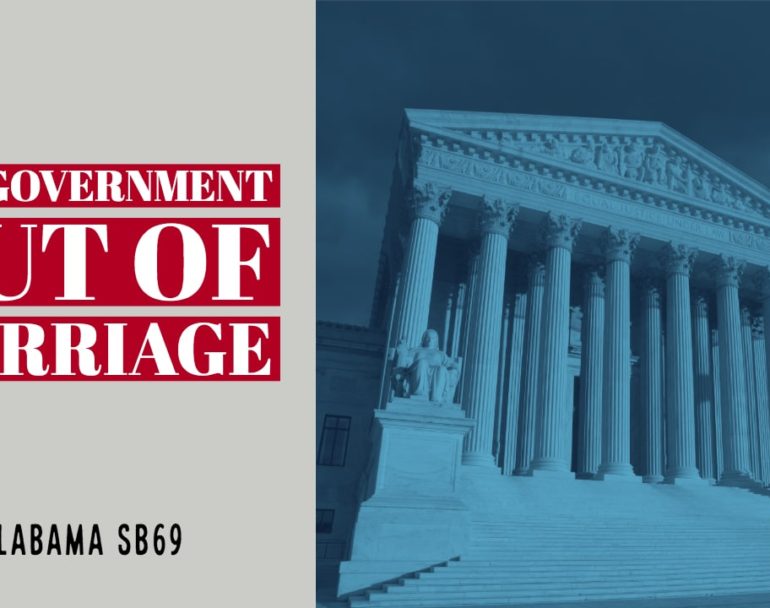
Alabama Committee Approves Measure to Eliminate Marriage Licenses, Nullify Federal Control in Practice
By: Mike Maharrey
MONTGOMERY, Ala. (April 11, 2019) – Yesterday, an Alabama House committee passed a bill that would abolish marriage licenses in the state and effectively nullify in practice both major sides of the contentious national debate over government-sanctioned marriage.
Sen. Greg Albritton (R-Bay Minette) introduced Senate Bill 69 (SB69) on March 5. The legislation would abolish all requirements to obtain a marriage license in Alabama. Instead, probate judges would simply record civil contracts of marriage between two individuals based on signed affidavits.
According to the bill summary, SB69 would “eliminate the requirement for solemnization of a marriage for it to be considered valid” and “specify that the judge of probate would have no authority to reject any recording of a marriage, so long as the affidavits, forms, and data are provided.”
On April 10, the House Judiciary passed SB69 with a “favorable” recommendation. The Senate previously passed SB69 by a 26-0 vote.
Similar bills have been introduced in Alabama every legislative session in recent years. Last year, SB13 also passed the Senate and the House Judiciary Committee but was never brought to the House floor for a vote.
While this change in the law may seem like semantics, it would be quite significant. It would end the requirement to get state permission before getting married. The state would merely record signed contracts between consenting individuals.
The proposed law would maintain a few state requirements governing marriage. Minors between the ages of 16 and 18 would have to obtain parental permission before marrying, the state would not record a marriage if either party was already married, and the parties could not be related by blood or adoption as already stipulated in state law.
Civil or religious ceremonies would have no legal effect on the validity of the marriage. The state would only recognize the legal contract signed by the two parties entering into the marriage.
In practice, the state’s role in marriage would be limited to recording marriages that have already occurred.
Passage of SB69 would take a step toward returning to the traditional Western custom in which the state had little to no involvement in marriage, even though it was a legal contract as well as a religious institution. Marriage in medieval Europe technically fell under the legal jurisdiction of the Catholic Church, with priests officiating weddings at the door of the community church. However, it was ultimately a private arrangement that did not require a third party in order to be considered legitimate.
In “The Middle Ages: Everyday Life in Medieval Europe,” Jeffrey Singman writes that proposed marriages were announced at the parish church of both persons for three Sundays, but this was in order to ensure problems such as preexisting marriage agreements did not arise. Still, “not every marriage followed these formalities.”
Singman writes:
“According to canon law, marriage could be contracted either by a vow of marriage expressed in the present tense or by a statement of future intent to marriage followed by sexual consummation. The latter sort of marriage in particular could take place without the participation of church or community. Such marriages were illegal, but not invalid; the although the couple might be prosecuted in the church courts, they remained legally married.”
In fact, state marriage licenses were initially used as a way to prevent interracial marriages. As a 2007 New York Times op/ed points out, licenses later became necessary in order to subsidize the welfare state.
“The Social Security Act provided survivors’ benefits with proof of marriage. Employers used marital status to determine whether they would provide health insurance or pension benefits to employees’ dependents. Courts and hospitals required a marriage license before granting couples the privilege of inheriting from each other or receiving medical information.”
In a modern political context, SB69 would reduce the state’s role in defining and regulating marriage, which has become a contentious issue and places a burden on government officials torn between the legal requirements of their jobs and their personal religious convictions. By limiting the state’s role in marriage, the legislation would allow Alabamans to structure their personal relationships as they see fit without interference or approval from the government.
Something rarely considered by those seeking to control the state’s definition of marriage is that a marriage license means a person requires government permission before getting married. In America, people generally cannot drive a vehicle without a license. People cannot practice law without a license, nor can they provide medical care. Put another way, under a licensing scheme, marriage is not a right, nor a religious institution, but a privilege granted by the state and limited by its requirements.
Consider this: In the same way a driver can lose their license if they break certain traffic laws, a man or woman, theoretically, could one day find their marriage license revoked for breaking certain “marriage” rules, whether it pertains to childrearing or their religious and political convictions.
Christopher Wesley, an associated scholar at the Mises Institute, wrote that “marriage is most endangered when it rests in the coercive hands of the State.”
Constitutionally, marriage is an issue left to the state and the people.
Removing state meddling in marriage would render void the edicts of federal judges that have overturned state laws defining the institution. The founding generation never envisioned unelected judges issuing ex-cathedra pronouncements regarding the definition of social institutions, and the Constitution delegates the federal judiciary no authority to do so.
WHAT’S NEXT
SB69 must now be brought to the floor for a vote.